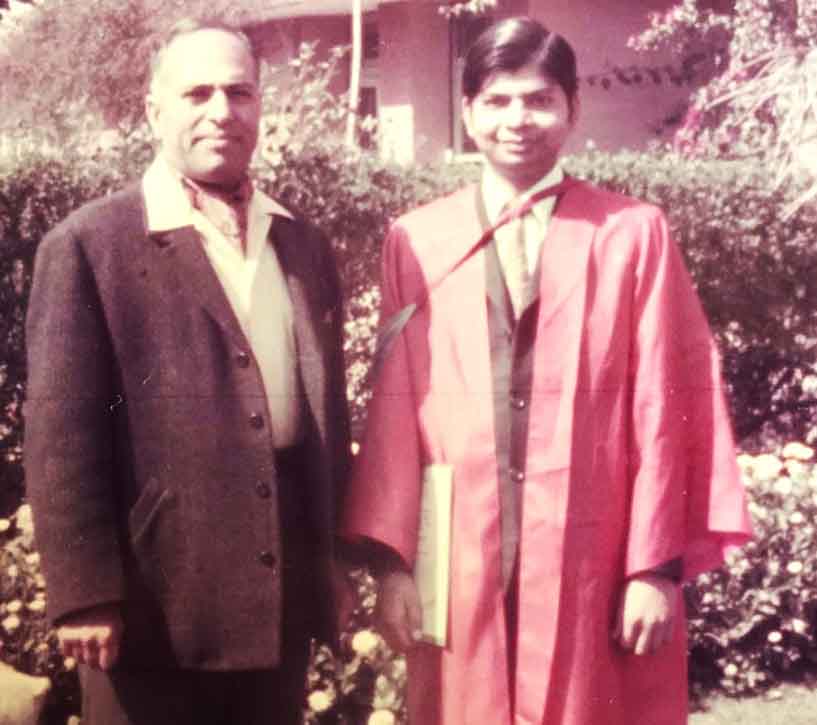
By Zafar Iqbal, PhD
موت کیا ہے انہی اجزاء کا پریشان ہونا زندگی کیا ہے عناصر میں ظہور ترتیب
ज़िन्दगी क्या है अनासिर में ज़ुहूर -इ तरतीब, मौत क्या है इन्ही अज्ज़ा का परेशां होना
Zindagi kya hai anasir mein zuhur-e tarteeb Maut kya hai inhi ajza ka pareshan hona
Life is an arrangement of components in a proper form whereas the disintegration of this arrangement of component is death.
On my first day as a student at the All-India Institute of Medical Sciences, a reference to a Lakhnavi poet evoking the biology of life kindled a deep sense of pride within me, hailing as I did from Lucknow. This marked the commencement of Professor G. P. Talwar’s insightful lectures on biological sciences for the institute’s incoming medical students. Through the evocative verses of Urdu poet Pandit Brij Narain Chakbast Lakhnavi, he adeptly navigated the complexities of life and death.
Years later, in 1974, during a visit to Lucknow from the USA, I had the honor of being interviewed at the All-India Radio Station Lucknow by the esteemed Ms. Uma Chakbast, fondly known as Uma didi. Amidst our conversation, she touched upon the status of Urdu in the USA. Intrigued, I ventured to ask her about her potential lineage to the renowned poet Chakbast. Her eyes sparkled with pride as she affirmed her connection to the illustrious poet, her grandfather. I fondly recalled my experience of Professor Talwar’s enthralling lecture on life’s biology. Later, during a visit to her home, I gratefully received an autographed copy of the book “Subh-e-Watan,” a compilation of Chakbast Lakhnavi’s works by Uma didi.
Dr. Talwar not only shaped my academic journey but also introduced me to a plethora of extracurricular activities unparalleled in other institutions. We were enveloped in a rich tapestry of liberal arts and cultural endeavors, enriched further by enlightening lectures from luminaries such as M. F. Hussain, Satish Gujral, and the spiritual sage Mahesh Yogi. Under Dr. Talwar’s guidance, I took charge of creating vibrant posters to promote these events.
From a scientific standpoint, our biochemistry department blossomed into a national epicenter for groundbreaking research and strategic planning. Esteemed academicians from diverse regions and returning Pool Officers from international assignments frequently graced our department. While my primary role was to assist with their presentations, I confess to occasionally rearranging slides in jest when the visitors overlooked the decorum expected towards students.
My hostel afforded picturesque views of lush lawns, bustling with joggers in the morning and cricket enthusiasts as the day progressed. An annual spectacle was the cricket clash between the faculty and postgraduate students. A particularly memorable match showcased Professor Talwar’s formidable batting skills. To everyone’s surprise, I, an inexperienced bowler, was entrusted with the task and remarkably dismissed Professor Talwar in just two deliveries. Though my peers humorously speculated about the potential postponement to my PhD due to this unexpected triumph, Dr. Talwar’s encouraging pat on my back was a moment I cherish to this day.
As time unfurled, Dr. Talwar moved on to establish the National Institute of Immunology, dedicating himself to pioneering research on leprosy and other endemic diseases in India. He subsequently founded the Talwar Foundation, a testament to his commitment to nurturing young researchers and scientists. Dr. Talwar remains an unwavering inspiration, continually pushing the frontiers of scientific inquiry and fostering the next generation of scientific visionaries. In a heartfelt interview on Rajya Sabha TV, he emphasized the importance of resilience, sincerity, and steadfast determination in pursuing one’s aspirations.
Among the plethora of accolades celebrating his scientific contributions, the Padma Bhushan Award bestowed upon him by the Government of India holds a special place.
In profound reverence and homage to Professor Raghupati Sahai Firaq Gorakhpuri, I’ve respectfully adapted one of his couplets to commemorate Dr. Talwar’s illustrious legacy.
aane vaalī nasleñ tum par faḳhr kareñgī ham-asro
jab bhī un ko dhyān aa.egā tum ne ‘Talwar’ ko dekhā hai
Forthcoming generations will be proud of you, my colleagues, Whenever they would comprehend that you saw Talwar.




Be the first to comment